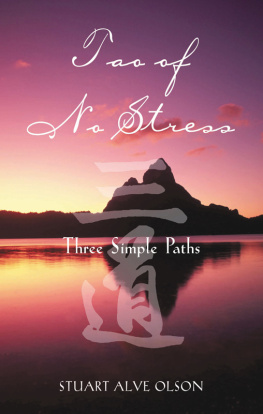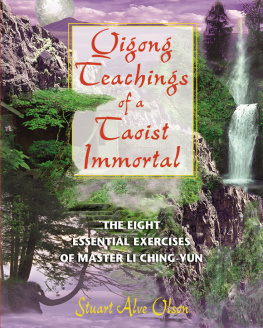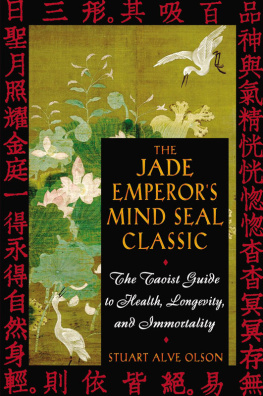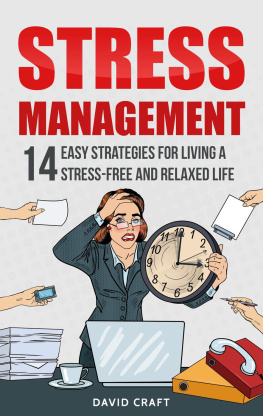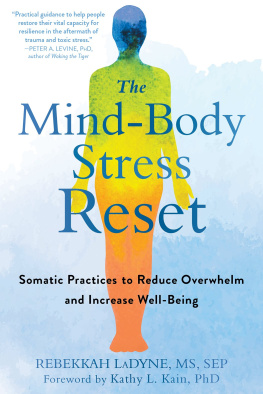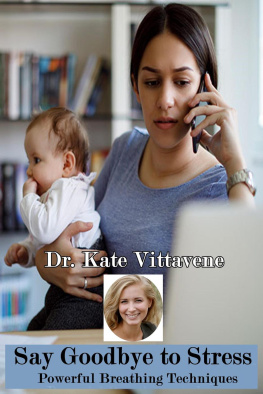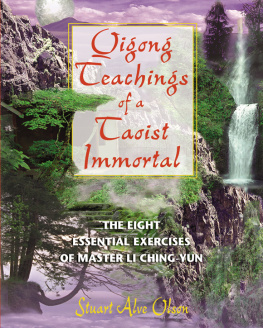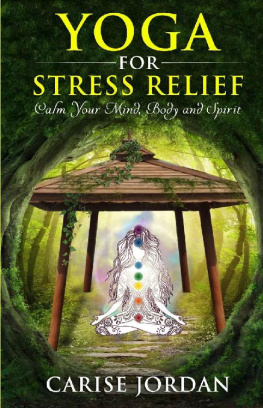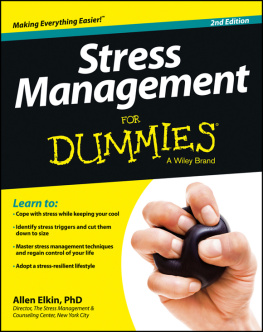T AO OF N O S TRESS
Three Simple Paths
Stuart Alve Olson
Healing Arts Press
Rochester, Vermont
Healing Arts Press
One Park Street
Rochester, Vermont 05767
www.InnerTraditions.com
Healing Arts Press is a division of Inner Traditions International
Copyright Stuart Alve Olson 2002
All rights reserved. No part of this book may be reproduced or utilized in any form or by any means, electronic or mechanical, including photocopying, recording, or by any information storage and retrieval system, without permission in writing from the publisher.
Note to the reader: This book is intended as an informational guide. The remedies, approaches, and techniques described herein are meant to supplement, and not to be a substitute for, professional medical care or treatment. They should not be used to treat a serious ailment without prior consultation with a qualified health care professional.
Library of Congress Cataloging-in-Publication Data
Olson, Stuart Alve. Tao of no stress : three simple paths / Stuart Alve Olson.
p. cm.
ebook ISBN 978-1-59477-596-3
print ISBN 0-89281-987-1
1. Stress management. 2. Taoism. I. Title.
RA785 . O46 2002
155.9042dc21
2001006744
Introduction: What is the Tao of No Stress?
When some of my students first suggested that I write about stress elimination, my immediate reaction was to say no, mostly because I have rarely suffered from the problems of stress, much less made it a focus of my study. But then I realized that my years of Taoist practices had indirectly provided me with numerous practical tools which alleviated the effects of stress. Taoism, at its very core is about achieving heightened mental and physical states of tranquility, which can be very useful to the modern day sufferer of stress.
I have spent over twenty-five years studying, learning, writing about, and teaching the daily disciplines of how to deepen ones state of relaxation and let go of physical and mental tension and anxiety; that is, how to let go of stress. I didnt consciously set out to learn how to stop suffering from stress, rather to learn how to achieve tranquility and relaxation of body and mind through the practices of tai chi, qigong, massage, and meditation, which just happened to create the conditions of not suffering the effects of stress.
Early in my life I was fortunate enough to have studied teachings and practices that showed me how to yield, accept, and remain calm in the worst of situations, so suffering the negative effects of stress hasnt been a factor in my life. I am by no means claiming that my life is trouble free, but I have learned how to not pile on the additional, negative effects of stress to whatever difficulties I am experiencing.
There is a familiar saying that warns never to ask people who arent rich how to get rich; if they knew, wouldnt they already be rich? In Taoism, no student would ever seek to learn from a teacher who had not achieved high levels of tranquility. No martial art student would attempt to learn from a teacher who had no martial skills. The same applies in finding out how to eliminate stress. Just as no psychologist or therapist would assume or expect that my years of teaching students how to calm and focus themselves would qualify me to practice psychology or therapy, I cannot assume or expect that a psychologists training necessarily ensures that they are truly competent in eliminating their patients stress, or their own for that matter. If you want to know how to eliminate stress, ask someone who is without stress.
Taoist teachings, from which the material in this book is drawn, contain wonderfully practical methods and advice for eliminating stress. The success of these practices can be witnessed in the long lives of great Taoist masters. Moreover, the methods presented in this book are a distillation of the past twenty-five years of my own experience. I can tell you that they have worked for me; and I am confident they will prove accessible and useful for anyone.
W HAT I S S TRESS?
Stress is by definition the sum of biological reactions to adverse stimuli that create a disturbance or interference to the homeostasis of an organism and result in emotional or physical strain or tension. The adverse stimuli can be either internal or external, and it is the persons reaction to them that can lead to illness or disease. Although every person has the capacity to adjust physically or emotionally to adverse stimuli experienced in his or her life, many people dont know how to make use of this capacity, and consequently suffer from stress.
T YPES OF S TRESS
There are two types of stress: alarm and continued. These are more commonly known as acute and chronic stress, respectively. I use the terms alarm and continued for clarity because are more reflective of the actual qualities possessed by each type of stress .
Alarm stress describes the response to an immediate physical threat. The medullas of your adrenal glands cause the release of the hormone epinephrine into your bloodstream. Your heart rate then increases, blood pressure rises, and the blood vessels dilate, which in turn decreases your blood sugar supply and dilates the pupils of your eyes. During alarm stress, the breath moves high up into your chest, your muscles feel cold, and your body undergoes what is called a protective response.
Alarm stress is rarely injurious, but, if the adrenals become too exhausted, the result can be fatal. This type of stress results from either a real threat or a falsely perceived one.
Continued stress is far more complex and dangerous, as it gradually weakens the adrenal glands, which in turn can adversely affect the heart, blood, and nervous system. When this happens, a wide range of ailments can ensue. The effects of continued stress can be experienced in three basic degrees: sporadic, chronic, and acute.
- Sporadic refers to periodic times in a persons life when he or she is under the strain of some perceived situation, and it usually disappears when the situation resolves itself. The situation need not be negative, as even positive emotions and experiences can create stress, such as falling in love, receiving an award, buying a new car, and so on. Normally, only minor illnesses are experienced from this type of stress effect.
- Chronic continued stress is much more serious, as it is a habitual reaction to almost all of lifes experiences. This chronic effect creates very serious health ailments, such as high blood pressure, heart attack, cancer, and a variety of other serious illnesses and diseases.
- The acute form of continued stress is the most serious, as it causes a complete shut down of psychological equilibrium, which is sometimes referred to as a nervous breakdown. This effect of continued stress is the most difficult to cure and can cause irreparable damage to both the central nervous system and the bodys immune system.
T HEORIES OF S TRESS
Western medicine has accepted the correlation between stress and illness, but does not outright claim that all forms of stress create an illness or ill-effect. In Western medicine, the apparent root cause of an illness is diagnosed based strictly on the symptoms of the illness. Taoism asserts that all stresses and anxieties have a physical and mental effect on the person, and that in the end all our illnesses have their source in negative mental actions or thoughts. Western skepticism can be partially justified, in that stress can affect a person either negatively or positively. Since all stress stimulates the adrenal glands, stress can sometimes create the capacity for individuals to perform wondrous physical feats. In certain individuals, stress can provide motivation for great accomplishments. The majority who suffer stress, however, do so in a negative way. It may be the case that when stress stimulates a positive response it is indicative of a person who has an increased supply of adrenal hormones. Inversely, those who react to stress in a negative manner have a decreased supply.
Next page
